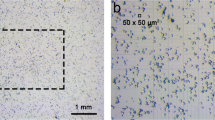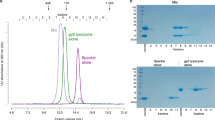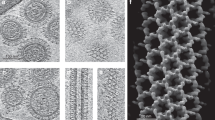Abstract
PHAGE T1, inactivated by formaldehyde, still injects its deoxyribonucleic acid, as can be shown by the degree of reactivation of ‘formaldehyde-hits’1. The formaldehyde inactivation of T1 is believed to result from a reaction with the amino-groups of the bases in the deoxyribonucleic acid1. As Staehelin2 has shown, formaldehyde in concentrations lower than 1 per cent reacts with free amino-groups of nucleic acids, but it does not react if these groups are involved in hydrogen bondings. Furthermore, the experiments of Nitschmann and Hadorn3 make a formaldehyde reaction with the free imino-groups of the bases improbable.
This is a preview of subscription content, access via your institution
Access options
Subscribe to this journal
Receive 51 print issues and online access
$199.00 per year
only $3.90 per issue
Buy this article
- Purchase on Springer Link
- Instant access to full article PDF
Prices may be subject to local taxes which are calculated during checkout
Similar content being viewed by others
References
Sauerbier, W. (previous communication).
Staahelin, M., Biochim. Biophys. Acta, 29, 410 (1958).
Nitschmann, H., and Hadorn, H., Helv. Chim. Acta, 27, 299 (1944).
Author information
Authors and Affiliations
Rights and permissions
About this article
Cite this article
SAUERBIER, W. Effects of Ultra-Violet Light on Hydrogen Bonds in Deoxyribonucleic Acid of Phage T1. Nature 188, 329–330 (1960). https://doi.org/10.1038/188329a0
Issue Date:
DOI: https://doi.org/10.1038/188329a0
This article is cited by
Comments
By submitting a comment you agree to abide by our Terms and Community Guidelines. If you find something abusive or that does not comply with our terms or guidelines please flag it as inappropriate.



